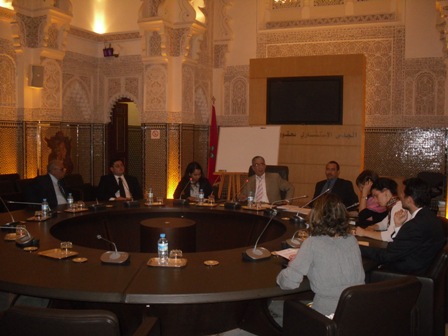CCDH PRESIDENT MEETS AN ARGENTINIAN PARLIAMENT DELEGATION
President of the Advisory Council on Human Rights (CCDH), Mr. Ahmed Herzenni, met yesterday an Argentinian parliament delegation in visit to Morocco from 17 to 23 October, at the headquarters of the Council in Rabat. The delegation was composed of Mr. Gustavo Canteros, MP and President of the Moroccan-Argentinian friendship at the Argentinean Chamber of Deputies, Ms Veronica Barzola, MP and member of the socialist group at the Argentinean Chamber of Deputies, Mr. Eduardo Endeiza, MP in charge of coordination and Ms Sandra Caballero, coordinator of parliamentary friendship groups at the same Chamber.In this meeting, Mr. Herzenni briefed the delegation on the Moroccan experience in the field of transitional justice in all its dimensions. He particularly shed light on community reparation, reconciliation process, institutional reforms in the field of human rights, reinforcement of the democratization process and the historic context within which the Council, as a national institution in charge of the protection and promotion of human rights, was created.

Mr. Herzenni informed the delegation about the objectives of the Council: protect and promote human rights, make recommendations on the harmonization of national law with international conventions ratified or adhered by Morocco, encourage the Kingdom to ratify or adhere international human rights conventions and treaties, study cases of human rights violations and report them with recommendations to the authorities concerned, promote and uphold human rights culture, etc. He indicated that Morocco benefited from the Argentinian experience in the field of truth seeking and pointed out that Morocco and Argentina had similar circumstances at the political level, especially in regards to their experience with past serious human rights violations. The two countries try now to get rid of this heavy burden and turn a new page to reconcile with one-self, guarantee the non-repetition of those abuses and uphold and protect human rights.
Mr. Herzenni said that reparation was first material. But after the creation of the Equity and Reconciliation Commission (IER), upon the recommendations of the Council, it gained moral characteristics as well. The Commission, whose mandate lasted for two years, worked on three axes: reparation, truth revealing and reforms of national legal system to guarantee non-repetition, fight impunity regarding human rights and fundamental liberties violations.
Because the mandate of the Commission was short, Mr. Herzenni said, the Council was assigned to follow-up the implementation of the IER’s recommendations. He added that the Council succeeded in achieving this objective.
The Argentinian delegation, for its part, praised the Moroccan experience in the field of transitional justice and the work of the Council in the field of human rights protection and promotion. They stressed the importance of strengthening international cooperation to end human rights violations.






















